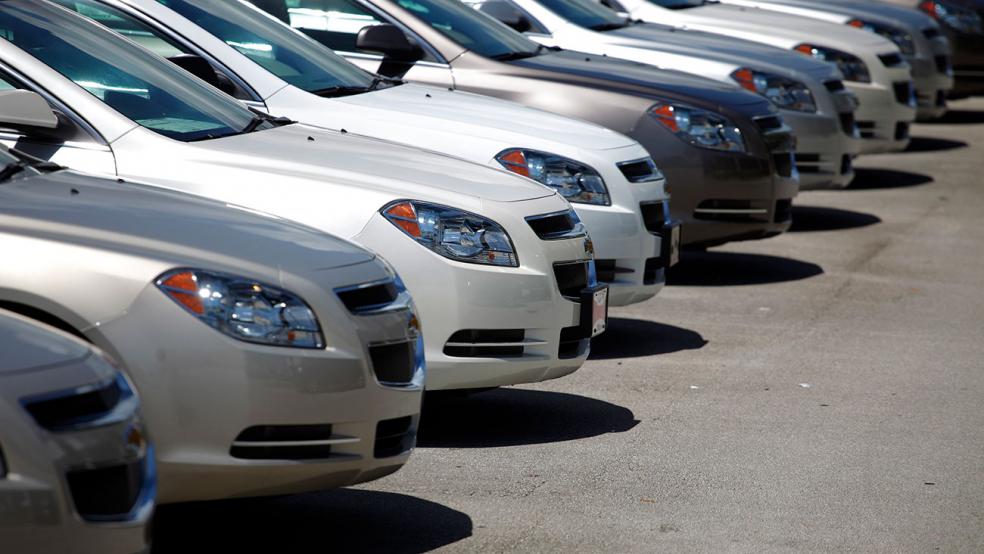Used-car prices are sliding, and some warn that this trend could have sharply negative effects on both relevant stocks and on the economy as a whole.
"This is a credit bubble in autos that is very reminiscent of the subprime mortgage crisis," Larry McDonald, head of global macro strategy at ACG Analytics, said Friday in an interview on CNBC's "Trading Nation."
Related: Why ‘Deep Subprime’ Auto Loans Are Beginning to Worry Wall Street
"The Federal Reserve kept interest rates too low for too long; the easy-money gravy train has funded a colossal supply of cars," said McDonald, who is known for his book about the decline of Lehman Brothers based on his time working there.
Indeed, the number of cars per household has reached all-time highs and car-dealer inventories are rising, according a Deutsche Bank report published this month. However, the report highlights that autos are a relatively small share of the overall U.S. economy; car production typically adds 0.1 percent to gross domestic product growth, and autos comprise less than 1 percent of total consumer spending.
This month, Bank of America Merrill Lynch published a report titled, "Are we heading into a car crash?" and highlighted weak March auto sales as a potential warning sign for the auto sector.
Citing work from John Murphy, the firm's lead U.S. auto analyst in equity research, chief U.S. economist Michelle Meyer wrote: "They are concerned about bloated inventories, particularly for used cars, which have already led to a decline in prices, as well as signs of stress in the auto financing market."
Related: The Next Financial Bubble? Auto Loans Soar as Delinquencies Rise
Still, Meyer wrote that so far the slowdown in the pace of auto sales is "manageable" for the economy.
"The auto sector is set to go from a slight positive for growth over the prior few years to a neutral/slight negative this year. The bigger issue would come from a sharp decline in the rate of auto sales, as John Murphy and team are increasingly concerned about," she wrote, adding that inventory is indeed hovering close to historical highs in non-recessionary times.
McDonald wrote in an email to CNBC that, specifically, auto rental companies Avis and Hertz would "have the most to lose in a continued trend of lower used car prices."
Bets on the failure of Hertz and Avis to repay their bonds, as measured by five-year credit default swaps, are on the rise as used-car prices fall and auto loan delinquencies edge higher. Elsewhere in the industry, automakers General Motors and Fiat Chrysler this month reported March sales figures that missed expectations; Reuters reported industry watchers are increasingly concerned about rising inventory levels.
When it comes to Hertz and Avis, McDonald's recommendation is simple: "Sell these stocks now," given his prediction that a decline in autos' residual values — the estimated value of a car at the end of a lease's expiration — will lead to a 10 percent decline in earnings for these companies.
Indeed, the technical setups for Avis and Hertz are "terrible," said David Seaburg, head of sales trading at Cowen & Co. Avis is down nearly 17 percent year to date, while Hertz has lost nearly 26 percent in the same time.
"Sell them with both hands. There's no reason to own them here," Seaburg said Friday on "Trading Nation." "Will we get trading bounces? Absolutely," he said, adding that "obviously we have a massive credit concern looming."
Recently, car dealerships have come under pressure from manufacturers to take on more inventory even though they could not sell what they have, Seaburg said, "so you knew at some point there was going to be a crack."
Still, the concern over autos may not be as pronounced for some experts who track credit. A comparison between the auto industry right now and the housing crisis is not a very good one, said Sandler O'Neill equity research analyst Jeffery Harte.
"The auto-lending market is so much smaller than the housing market, so even if it got it as badly as mortgages, it wouldn't have nearly as big an effect," Harte told CNBC in a Monday phone interview.
For auto lenders the picture may appear direr, and falling used auto prices and slowing loan growth are indeed areas Harte is watching, but overall he sees the industry as relatively stable at this juncture.
Hertz declined to comment, and Avis did not immediately reply to a request for comment.
This article originally appeared on CNBC. Read more from CNBC:
The middle-class isn't just shrinking, it's changing in one key way
Dow closes 200 points higher, Nasdaq posts record session after French election
McDonald's hits all-time high ahead of earnings, but this could send shares tumbling

